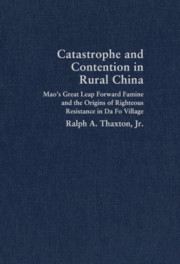 Catastrophe and Contention in Rural China
Catastrophe and Contention in Rural China Book contents
- Frontmatter
- Contents
- Acknowledgments
- Cast of Characters: Da Fo Village (Great Buddha), 1920–1993
- Chronology of Important Events
- Map 1 Provinces of China, neighboring countries, and area of study
- Map 2 Hebei-Shandong-Henan border area, showing location of Da Fo village
- INTRODUCTION
- 1 THE REPUBLICAN ERA AND THE EMERGENCE OF COMMUNIST LEADERSHIP DURING THE ANTI-JAPANESE WAR OF RESISTANCE
- 2 THE ASCENT OF THE VIGILANTE MILITIA: THE VIOLENT ANTECEDENTS OF MAO'S WAR COMMUNISM
- 3 THE ONSET OF COLLECTIVIZATION AND POPULAR DISSATISFACTION WITH MAO'S “YELLOW BOMB” ROAD
- 4 THE MANDATE ABANDONED: THE DISASTER OF THE GREAT LEAP FORWARD
- 5 STRATEGIES OF SURVIVAL AND THEIR ELIMINATION IN THE GREAT LEAP FORWARD
- 6 THE ESCAPE FROM FAMINE AND DEATH
- 7 INDIGNATION AND FRUSTRATED RETALIATION: THE POLITICS OF DISENGAGEMENT
- 8 THE MARKET COMES FIRST: THE ECONOMICS OF DISENGAGEMENT AND THE ORIGINS OF REFORM
- 9 PERSISTENT MEMORIES AND LONG-DELAYED RETALIATION IN THE REFORM ERA
- CONCLUSION
- Bibliography
- Index
- Plate section
4 - THE MANDATE ABANDONED: THE DISASTER OF THE GREAT LEAP FORWARD
Published online by Cambridge University Press: 14 May 2010
- Frontmatter
- Contents
- Acknowledgments
- Cast of Characters: Da Fo Village (Great Buddha), 1920–1993
- Chronology of Important Events
- Map 1 Provinces of China, neighboring countries, and area of study
- Map 2 Hebei-Shandong-Henan border area, showing location of Da Fo village
- INTRODUCTION
- 1 THE REPUBLICAN ERA AND THE EMERGENCE OF COMMUNIST LEADERSHIP DURING THE ANTI-JAPANESE WAR OF RESISTANCE
- 2 THE ASCENT OF THE VIGILANTE MILITIA: THE VIOLENT ANTECEDENTS OF MAO'S WAR COMMUNISM
- 3 THE ONSET OF COLLECTIVIZATION AND POPULAR DISSATISFACTION WITH MAO'S “YELLOW BOMB” ROAD
- 4 THE MANDATE ABANDONED: THE DISASTER OF THE GREAT LEAP FORWARD
- 5 STRATEGIES OF SURVIVAL AND THEIR ELIMINATION IN THE GREAT LEAP FORWARD
- 6 THE ESCAPE FROM FAMINE AND DEATH
- 7 INDIGNATION AND FRUSTRATED RETALIATION: THE POLITICS OF DISENGAGEMENT
- 8 THE MARKET COMES FIRST: THE ECONOMICS OF DISENGAGEMENT AND THE ORIGINS OF REFORM
- 9 PERSISTENT MEMORIES AND LONG-DELAYED RETALIATION IN THE REFORM ERA
- CONCLUSION
- Bibliography
- Index
- Plate section
Summary
Just before the June wheat harvest in 1958, party leaders in Da Fo responded positively to the central government demand to upgrade the movement for agricultural collectivization by galvanizing popular support to join with nineteen other villages in Liangmen district to form the Liangmen People's Commune. Four times the size of the failed five-village APC, this commune unit included Beitoucun, Wencaicun, Taigu, Da Weicun, Xiao Weicun, Minglizhuang, Shangdizhuang, Liangmen, Liangmenpo, Wanxiuzhuang, Xiangtianzhuang, Weiliancun, Shennongzhuang, Shichaomiao, and Jingweizhuang. The commune headquarters was in Liangmen, and Beitoucun was designated the commune's model production brigade. At the outset of the Great Leap, Zhou Enlai visited Beitoucun and declared the village a socialist pacesetter.
Many of Da Fo's party leaders played a critical role in the formation of Liangmen People's Commune. Bao Zhilong became the vice-director of the commune and a central player in commune affairs; Bao Peijian, one of the first party members in Da Fo, was placed in charge of the Commune Dispute Mediation Committee and also served as a member of the Commune Work Inspection Team; Bao Zhendao became the head of the People's Commune Bank; Bao Yibin, the son of PLA martyr Bao Yidai, was given the position of Commune Finance Director; and on and on it went. All of these Bao lineage Communist Party leaders worked and lived for extended periods in the people's commune headquarters in Liangmen, occasionally returning to Da Fo to tend to family matters and issues bearing on the village's relationship to the larger commune.
- Type
- Chapter
- Information
- Catastrophe and Contention in Rural ChinaMao's Great Leap Forward Famine and the Origins of Righteous Resistance in Da Fo Village, pp. 118 - 156Publisher: Cambridge University PressPrint publication year: 2008


